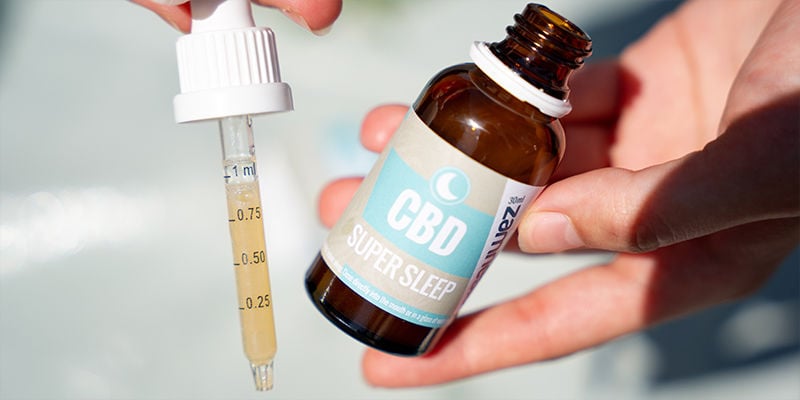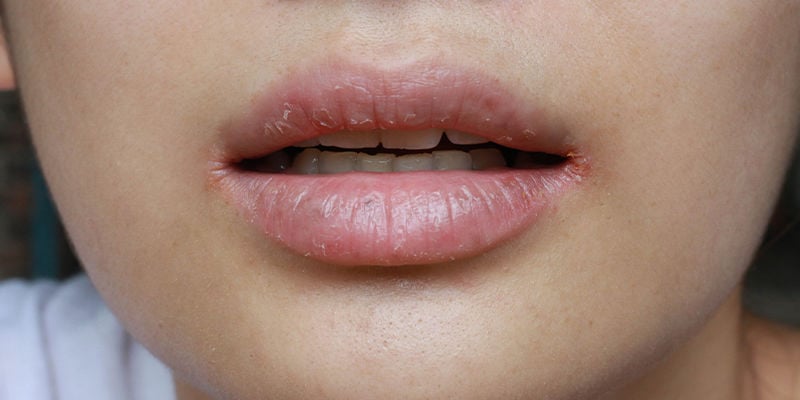
CBD And Sleep: How CBD May Improve Sleep Quality
CBD is a very popular wellness supplement, especially in relation to sleep. But how does it work, and how should you use it? In this article, we examine what we know about the relationship between CBD and sleep.
People love CBD, and not without good reason. This cannabinoid first entered the mainstream when anecdotal accounts of its potential benefits spread like wildfire. This was swiftly followed by increasing study on CBD’s full potential. Today, one of the most popular uses of CBD is to promote healthy sleep. In this article, we look at how CBD might help with sleep, and how best to use it for this purpose.
What is CBD?

Cannabidiol (CBD) is a non-intoxicating chemical compound (specifically, a “cannabinoid”) found in relative abundance in cannabis plants. When consumed by humans, CBD interacts with the endocannabinoid system (ECS). The ECS exists throughout the brain and body, and is primarily made up of CB1 and CB2 receptors, which are found in the brain, immune system, nervous system, and pretty much everywhere else.
Naturally, these receptors interact with endogenous cannabinoids—those made by the body. However, as cannabinoids from cannabis have a similar shape to our own endocannabinoids, they too are able to bind to or block these receptors to some degree, influencing the body’s signalling systems and giving rise to altered states.
While some cannabinoids exert effects by directly binding to cannabinoid receptors, the exact mechanisms of CBD are not so well understood, and are believed to be more varied. It appears that, as opposed to primarily binding to or blocking receptors directly, CBD inhibits the breakdown of anandamide, thereby increasing its concentration in the body. Anandamide, also known as the "bliss molecule", is thought to increase feelings of well-being and happiness.
How can CBD improve sleep quality?

CBD is thought to potentially affect sleep in numerous ways. However, it should be noted that any claims on CBD’s impact on sleep are yet unproven, and are worthy of much more scientific scrutiny. Still, it’s worth examining the evidence available to us at present.
Can CBD help insomnia?
Insomnia is characterised by an inability to fall asleep and/or stay asleep. It affects a large number of people and is linked to an ever-growing range of health conditions.
It may be that CBD can work behind the scenes to promote a healthy sleep cycle, thereby helping people to fall asleep more easily and stay asleep for longer. Exactly how it might do this is unclear, but it seems that its potential effect on mood and stress response has something to do with it.
For example, a 2021 journal article highlights that out of seven double-blind placebo-controlled clinical trials on CBD for stress, all showed data associated with a reduced stress response, and that CBD was “non-inferior” to existing pharmaceutical competitors in this regard (Henson et al. 2021). As stress, and the stress hormone cortisol, are known to reduce melatonin production (the sleep hormone) and make sleeping more difficult, it could be that CBD promotes healthy sleep by affecting the stress response.
Numerous studies have also sought to determine CBD’s effect on anxiety—which is known to increase the occurrence of, and exacerbate, insomnia. A 2003 review of several studies concludes that CBD shows promise in relation to anxiety and is worthy of further study (Skell et al.). In the 20 years following that study, many more have gone on to elucidate these findings.
The importance of a good night's sleep

A good night’s sleep is crucial to health and well-being. Prolonged periods of bad sleep can lead to health conditions such as:
- Depression
- Anxiety
- Heart disease
- Stroke
- Weakened immune system
- Many more
In fact, sleep deprivation negatively impacts pretty much every mental and physical process in the body. So getting regular, good sleep is by no means a luxury, but one of the fundamental building blocks to a good life—so don’t take it for granted!
While we can use certain drugs and compounds to help get us back into a good rhythm with sleep, ultimately it comes down to sticking to a schedule and regularly exercising.
How to consume CBD
If you want to help yourself build a better relationship with sleep, then you might consider using CBD. In the following section, we’ll explore how to use CBD for sleep.
CBD sleep products

While you can choose from a wide array of CBD products, certain ones may be more suitable in the realm of promoting healthy sleep.
At Zamnesia, we have CBD products specifically designed to assist with sleeping. Some recommended products are:
- Zamnesia Super Sleep: This CBD oil contains golden-grade CBD, melatonin, and liposomes, all of which work in harmony to help you get a full night’s rest.
- Zamnesia Pre-Sleep: These capsules are designed to be taken before you go to bed, and contain 2.5mg of CBD and 1.5mg of melatonin. Capsules are easy to take and easy to dose.
- Zamnesia Solid Sleep: These capsules contain a mix of CBD, CBN, and 5-HTP. All of these compounds are thought to aid rest, so this formula is perfect for helping you to fall asleep.
Dosing CBD for sleep

Dosing CBD depends on the product. Each product will come with its own dosing guidelines, and these should be followed. However, it’s worth noting that the appropriate dose for CBD is not currently known. For instance, a normal dose for a CBD product might be anywhere between 2.5 and 20mg. However, in certain human studies, doses of 500mg and more of CBD have been shown to be safe and well-tolerated. Still, it’s generally best to start with a lower dose, observe the effects over a period of at least a week, then gradually increase your intake until you hit a “sweet spot”.
The suggested dose is always a good place to start, but don’t be afraid to try more or less.
Side effects of CBD

Fortunately, CBD exhibits only mild side effects. However, some users can experience:
- Dry mouth
- Dizziness or lightheadedness
- Changes in appetite
- Digestive changes
If you experience these effects, there should be no need to worry. But it’s up to you to assess whether they are acceptable or not. With any questions or concerns, contact your doctor.
CBD for sleep: A potential aid

From both scientific and anecdotal evidence, it appears that CBD could affect a person’s ability to fall asleep and stay asleep. However, the mechanisms by which it may do this, and how best to achieve these effects, remain unknown. So, the best thing you can do for yourself is experiment with different doses and products to see which, if any, work for you.
Bear in mind that while CBD might assist you in improving your sleep, it's not a substitute for a generally healthy life and sleep pattern. At most, it can form one part of a bigger puzzle.
- Henson, Jeremy D., Vitetta, Luis, Quezada, Michelle, Hall, & Sean. (2021/1). Enhancing Endocannabinoid Control of Stress with Cannabidiol - https://www.mdpi.com
- Skelley JW, Deas CM, Curren Z, & Ennis J. (2020 Jan-Feb). Use of cannabidiol in anxiety and anxiety-related disorders - https://pubmed.ncbi.nlm.nih.gov
-
 6 min
16 May 2023
The 9 Best Melatonin-Free Natural Sleeping Aids
Do you struggle to drift into a healthy, restful slumber? You're not alone—a good night's sleep is a rare treat for lots of people. As such, many individuals turn to sleep aids. While melatonin is...
6 min
16 May 2023
The 9 Best Melatonin-Free Natural Sleeping Aids
Do you struggle to drift into a healthy, restful slumber? You're not alone—a good night's sleep is a rare treat for lots of people. As such, many individuals turn to sleep aids. While melatonin is...
-
 8 min
10 October 2022
How To Use Cannabis To Improve Sleep
Le cannabis est utilisé à bien des escients, y compris la promotion d'un sommeil sain. Mais bénéficie-t-il réellement au sommeil ? Est-il plutôt nocif ? Quels composés précis du cannabis sont...
8 min
10 October 2022
How To Use Cannabis To Improve Sleep
Le cannabis est utilisé à bien des escients, y compris la promotion d'un sommeil sain. Mais bénéficie-t-il réellement au sommeil ? Est-il plutôt nocif ? Quels composés précis du cannabis sont...
-
 3 min
26 November 2019
Here Are 8 Common Myths About CBD
CBD is more popular than ever, but it's still very much misunderstood by most people. In this article, we debunk 8 common myths about CBD.
3 min
26 November 2019
Here Are 8 Common Myths About CBD
CBD is more popular than ever, but it's still very much misunderstood by most people. In this article, we debunk 8 common myths about CBD.
-
 3 min
18 November 2019
What's The Difference Between CBD Oil And Hemp Oil?
CBD has become a household name. With hundreds of CBD products available, it can be difficult to understand the differences. There's a lot of confusion surrounding the distinction between CBD oil...
3 min
18 November 2019
What's The Difference Between CBD Oil And Hemp Oil?
CBD has become a household name. With hundreds of CBD products available, it can be difficult to understand the differences. There's a lot of confusion surrounding the distinction between CBD oil...













 United States
United States










